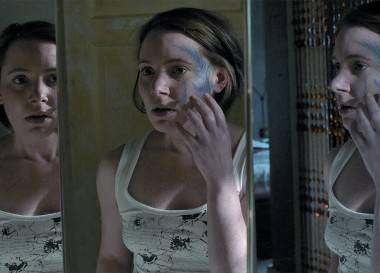
Victoria Bidewell in Derek Franson’s Comforting Skin.
Interview – actress Victoria Bidewell on Comforting Skin
– by Melissa Wade
We all want to feel comfortable in our skin. But what if that skin was so inviting that it became your sole companion, your lover – and a jealous, possessive and demanding one at that?
That’s the premise behind Comforting Skin.
Written directed by Derek Franson, the new Vancouver indie horror flick stars Victoria Bidewell as Koffie, a girl with a tempestuous tattoo. The movie is definitely worth a viewing – it screens Sunday April 7 at the Rio Theatre (more info here) – and part of that reason is Bidewell’s convincing portrayal of a vulnerable young woman, struggling to feel comfortable in her own skin.
The role demanded a lot from the Saskatoon-born Bidewell, who was awarded the Best Actress at the 2012 Fantaspoa Film Festival for her portrayal of the vulnerable Koffie. I spoke with her about her connection with the character, her co-star Tygh Runyan, and why every woman should try Pop Rocks instead of bath salts in the tub.
Melissa Wade: What attracted you to this role?
Victoria Bidewell: Well, it’s an actresses dream isn’t it? Have you seen the movie?
MW: Yes, I watched it yesterday.
VB: Oh, great. Well, it was a great script, a great part, and a very demanding and challenging role, and those are the kind of roles I’m interested in. It scared me [laughs]. I was just excited by it and fell in love with the part right away. I felt a connection to the character. I felt I understood her. I felt the part really captured the things that women in their twenties go through, not necessarily to the extent of the character’s mental issues, but the insecurities.
MW: How did you get into that very fragile state of mind?
VB: It’s just a matter of staying open. I try not to place any judgments on any character, and I think that helps me to really drop into my character. I had to spend a lot of time by myself doing a lot of self-reflection, and trying to connect to my own vulnerability.
MW: Did you discover new things about yourself through this role?
VB: Yes! I discovered that I’m not a victim. There’s always a need for love, to go out and get love, and find love, and that propels me every day, that keeps me pushing forward. I think that character does that. She has a lot of hope, and a very strong need to be loved, and I really related to that.
MW: What scene did you enjoy filming the most?
VB: Â Definitely the scenes when I’m alone with the tattoo. I had a lot of fun. We did some crazy stuff. I’ve never done anything where I had to do special effects. It was a real learning experience. They would tell you where the tattoo was, and I had to imagine that.
And every scene with Tygh. He made me laugh. Â He’s a really great, talented actor and I was very lucky that he played Nathan. I just had a blast with him.
MW: I could tell he was funny…
VB: Yeah, he’s just a really open, really fun actor to work with, very adventurous.
MW: What scene did you have a hard time with? Were there any in particular that you struggled with?
VB: A lot of the times when we were shooting outside, and it was very cold [laughs]. But the emotional stuff wasn’t a struggle. Once you’re in the character it just happens. But, I would say that sometimes it was very, very cold.
MW: I have to ask you about the scene with the Pop Rocks in the bathtub. Â When I watched the scene I couldn’t believe it and thought to myself: I have got to try this one day. How did it feel?
VB: I laughed so hard. It feels like little tickles on your skin. I recommend every woman try it instead of bath salts [laughs]. It was a really fun thing.
MW: I’m wondering if I’m off with my interpretation of the film, so I’m going to ask you what you think. Do you think Koffie’s relationship with her skin is a metaphor for a woman’s relationship herself, ultimately?
VB: I’ve never heard it interpreted that way, but I really like that. I would say that it is. It’s such a hard time for us to get into our comfort zone and to really feel good about ourselves, looks-wise and body image-wise, to find that happiness and that self-love. I really think the film has a strong message there, without it really planning to have that message. It’s really beautiful.
MW: Yeah, I didn’t find it forcing any kind of message, but the subtext was there.
VB: Yeah, it’s like, here I am. I’m alive, and I want to have the best time in this body, in this design that I’ve been given and how can I do that.
VB: Well, thank you.

